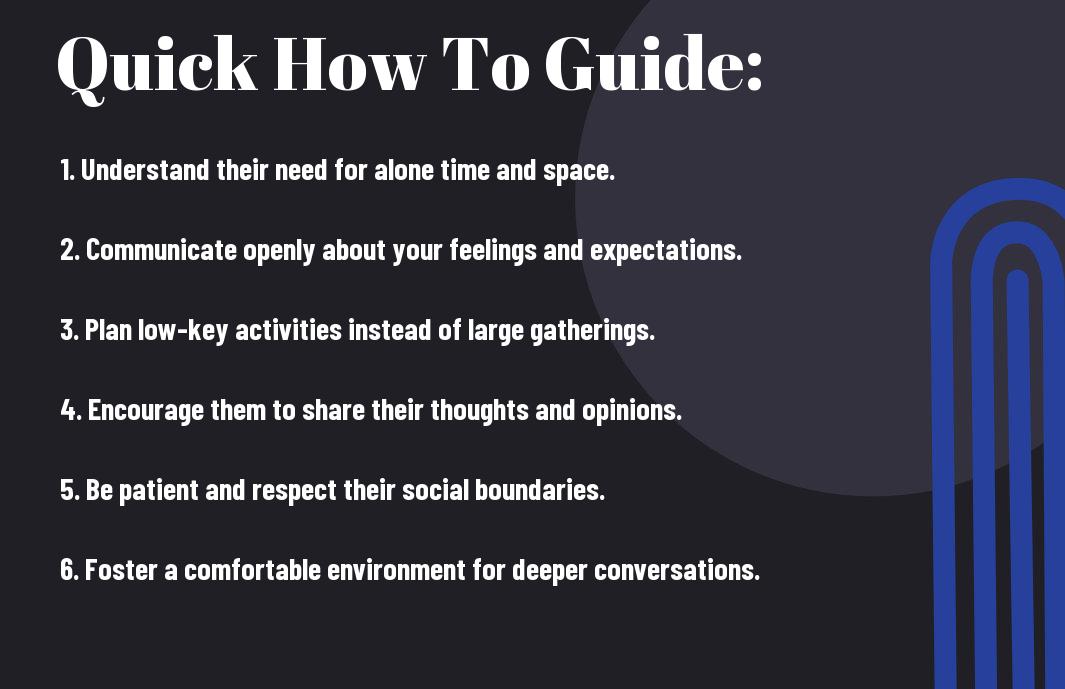Dating someone who’s an introvert can often present unique challenges, as introverts typically recharge their energy through solitude and might prefer quiet, intimate settings over large social gatherings. Understanding your partner’s perspective, allowing them the space they need, and fostering open communication are key to nurturing your relationship. This guide will help you navigate the nuances of dating an introvert, ensuring that both your needs are met while fostering a supportive and loving environment.
Understanding Introversion
To effectively navigate the waters of dating an introvert, it’s necessary to grasp the core nature of introversion. Introverts often recharge their energy through solitary activities and may require more personal space than extroverts. Recognizing their need for quiet reflection and downtime can help foster a thriving relationship where both partners feel understood and valued.
Characteristics of Introverts
There’s a unique set of traits that often define introverts. They tend to be more introspective, prefer deep conversations over small talk, and may feel overwhelmed in large social settings. Understanding these characteristics can help you appreciate their perspective and create an environment where they feel comfortable expressing themselves.
Common Misconceptions
Assuming introverts are shy or antisocial can lead to misunderstandings in your relationship. While they might enjoy solitude, that doesn’t mean they don’t value social connections or have a rich inner life. It’s necessary to look beyond surface-level assumptions and recognize that introverts can be engaging and vibrant companions, just in their own unique way.
It’s important to realize that many misconceptions stem from a lack of understanding about introversion. You might find yourself thinking that introverts dislike socializing altogether, but in reality, they appreciate quality time spent with a few close friends or loved ones. Enjoying peaceful moments or solitude does not equate to loneliness or dissatisfaction with a relationship; introverts simply nurture connections differently and thrive in environments that respect their need for balance. By challenging these misconceptions, you can develop a deeper connection with your introverted partner.

Tips for Effective Communication
Assuming you’re dating an introvert, effective communication is key to building a strong relationship. Here are some tips to enhance your conversations:
- Be patient and give them time to express themselves.
- Avoid overwhelming them with too many questions at once.
- Use non-verbal cues to show you’re engaged and listening.
- Encourage them to share their feelings by creating a comfortable environment.
Perceiving their need for space will help you foster a deeper connection.
Listening and Asking Questions
Assuming you want to engage in meaningful conversations, prioritizing active listening and thoughtful questions is necessary. Give your introverted partner the floor to express their thoughts fully, and ask open-ended questions that invite deeper dialogue. This establishes trust and shows your genuine interest in their feelings and experiences. By allowing silences during the conversation, you’ll encourage them to gather their thoughts without feeling pressured.
Encouraging Openness
Now, to build a strong relationship with your introverted partner, create opportunities for them to open up. This means providing a safe space where they feel comfortable sharing their thoughts without fear of judgment. Small gestures such as initiating conversations in a relaxed setting or combining activities they enjoy can help them feel more at ease. Additionally, expressing your own thoughts can show that you value transparency and vulnerability, encouraging them to reciprocate.
With consistent effort, fostering openness will strengthen your bond. Acknowledge their efforts in sharing and reciprocate with your own experiences, creating a balance in your conversations. This encourages an environment of trust, allowing your introverted partner to feel valued and understood. Celebrate their willingness to open up; it’s a positive step towards a healthy partnership.

Creating Comfortable Social Settings
Despite the common misconceptions about introverts, creating social settings that are comfortable for them is necessary. It is important to be mindful of their preferences, as overwhelming environments can lead to stress and discomfort. By choosing intimate gatherings or low-key outings, you can help your introverted partner feel at ease while still enjoying time together. Consider incorporating their interests into social activities to foster a sense of belonging and enjoyment.
Choosing the Right Environments
Environments play a significant role in how your introverted partner interacts with others. Opt for venues that have a relaxed atmosphere, such as cozy cafes, small gatherings at home, or serene parks. The key is to choose locations that allow for organic conversations and a sense of intimacy, rather than loud, chaotic spaces that may feel overwhelming. You can also gauge their preferences by discussing what they feel comfortable with beforehand.
Balancing Social Time and Alone Time
While socializing is important, it’s also vital to acknowledge the need for alone time, especially for introverts. Finding the right balance means being aware of how your partner feels after social events. Introverts often require downtime to recharge, so be receptive to their needs and plan your social calendar accordingly. By respecting their space, you enhance your relationship and allow them to thrive in shared experiences.
With a thoughtful approach to balancing social and alone time, you can create a harmonious relationship dynamic. Schedule time for outings, but also prioritize quiet evenings at home or individual activities where your partner can recharge. Discussing your plans and preferences openly will help you find a rhythm that works for both of you. Making this balance a priority demonstrates your commitment to understanding and valuing your partner’s introverted nature.
Nurturing Emotional Connections
Keep in mind that nurturing emotional connections with your introverted partner involves understanding their need for deeper interactions rather than frequent socializing. You might explore intimate conversations and quality time together in comfortable settings. Consider reading more about this dynamic in the discussion on Dating an introvert, what to expect and should I continue?.
Building Trust and Comfort
Trust is the foundation of any relationship, and establishing it with your introverted partner means creating a safe space for them to express their thoughts and feelings. Encourage open communication and validate their emotions, allowing you both to grow closer and develop a deeper bond.
Respecting Boundaries
Some individuals require boundaries to feel comfortable in a relationship. Understanding and respecting these boundaries shows your partner that you value their feelings and personal space, which is important for building a strong connection.
Respecting your partner’s boundaries involves paying attention to their cues and preferences. For instance, they might need time alone to recharge after social gatherings or may feel overwhelmed in large groups. By acknowledging these needs and adjusting your plans accordingly, you demonstrate your support for their well-being and foster a healthier relationship dynamic.
Recognizing and Adapting to Their Needs
All relationships require understanding, and when dating an introvert, it’s important to recognize and adapt to their unique needs. This means being observant of their social preferences and emotional cues. You may find that they value quiet time alone and need space to recharge after social interactions. By tuning into these aspects and offering the right balance of social engagement and solitude, you can foster a supportive environment that honors their introverted nature.
Identifying Triggers of Stress
Even the most composed introverts can experience stress from overwhelming social situations. It’s important to identify what triggers this stress in your partner, such as crowded events or prolonged social engagements. Pay attention to their body language and mood changes during gatherings, and have open conversations about their boundaries. This will help you create a supportive atmosphere that encourages them to express their feelings without fear of judgment.
Supporting Self-Care Practices
Adapting to your introverted partner’s self-care needs involves understanding their preferred methods of recharging. Encourage practices like quiet time, reading, or engaging in solitary hobbies that replenish their energy. Show support by planning low-key activities or providing them with time alone after social events, allowing them to decompress. By prioritizing their well-being, you create a nurturing space where they can thrive emotionally.
Plus, establishing a self-care routine together can enhance your bond. Suggesting activities like yoga, meditation, or nature walks allows you to both unwind while respecting your partner’s introverted nature. Regular check-ins on how they prefer to spend their downtime will communicate your support. By integrating these self-care practices into your relationship, you create a safe haven that honors their individuality and promotes a deeper connection.
Long-Term Considerations
Many factors come into play when dating an introvert, especially regarding long-term compatibility. It’s crucial to discuss your future together, including relationship goals, personal aspirations, and the balance between social lives. Your understanding and respect for their need for solitude can significantly impact the longevity and health of the relationship.
Navigating Future Challenges
Clearly, dating an introvert may present unique challenges over time. As you grow together, ensure you create a safe space for open communication, so you can address any potential issues before they escalate. This approach helps to navigate the inevitable changes and challenges that every relationship faces, allowing both partners to feel heard and valued.
Evaluating Relationship Compatibility
Considerations regarding relationship compatibility are vital to ensuring your connection remains strong. Take a moment to reflect on your shared values, interests, and lifestyle choices. This understanding will help establish the foundation of your relationship, creating a space where both you and your introverted partner feel understood and appreciated.
This reflection should include how you both approach social situations, emotional needs, and communication styles. Compatibility is about finding a balance between your extroverted tendencies and their introverted preferences, ensuring you can both thrive within the relationship. Honest conversations will help you identify areas of synergy and potential growth, creating a harmonious partnership that respects both personalities.
To wrap up
With these considerations in mind, you can effectively navigate dating someone who’s an introvert. By respecting their need for personal space, engaging in meaningful conversations, and gradually introducing them to social situations, you can build a strong and supportive relationship. Additionally, practicing patience and understanding will help you both feel more comfortable and connected. Embrace the unique qualities that make your introverted partner special, and your bond can flourish in ways you never expected.










